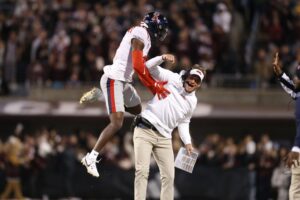
For only the second time in school history, the Ole Miss Rebels have put together a 10-win season. Regular season, that is.
While not perfect, there’s no other way to describe the year as anything other than successful. Despite playing the fifth toughest schedule in the country, the Rebels managed to reach a double-digit win total (10-2). And both of their losses were to top-10 teams, including one to the top-ranked Georgia Bulldogs.
In fact, in hindsight, one can make the argument that Ole Miss was a few key plays away from winning the SEC West title. Their only other loss was a reasonably narrow defeat to Alabama in Week 4. In that defeat, two obvious misses from Jaxson Dart would have directly led to Rebel touchdowns. While every team has “what if” moments throughout the season, for Ole Miss fans, those are two of the biggest.
Keeping all other results the same, a win over the Crimson Tide would’ve ended up putting Ole Miss atop the SEC West and sent them to Atlanta. However, even with the missed opportunities, it proved to be an incredible run for the Rebels.
The Lane Kiffin Factor
It’s worth noting that both 10-win regular seasons have come under current head coach Lane Kiffin. And with a win in the team’s upcoming bowl game (to be determined), Kiffin would find himself at roughly a 70% win percentage in his time in Oxford. That would put him four percentage points back of the legendary John Vaught. It would also be the best winning percentage from a Rebel coach since Vaught.
But apart from simply wins, Kiffin has managed to bring plenty of excitement to the program. He’s a younger guy who brought an up-tempo offense to Oxford. He’s also extremely active on social media, which is a key connection to the younger generation. And he uses all of that as a major recruiting pitch, which has also improved since he took over the program, especially in terms of the transfer portal.
While his future in Oxford may come in doubt every offseason, there’s no denying that he’s had a huge impact on the program, and university, as a whole. Expect that to continue as long as he sticks around.
The Offense
On the offensive side of the ball, the Rebels performed reasonably well. To be fair, they weren’t quite as high-scoring as we’ve grown accustomed to seeing in a Kiffin-led offense. They finished the season ranked 22nd in the country in scoring, at 34.8 points per game. If you turn to yards per game, they finished 16th, at just over 455 yards per game.
But the biggest concern from the offense wasn’t the production of the unit. It was the inconsistency of the group, and it proved to be a problem all year long. Quite simply, there were too many moments where the offense seemed to hit a rut that took multiple possessions to get out of. Part of that was due to conservative playcalling. While the offense was tremendous when the playbook was open and allowing Dart to throw the ball downfield, there were too many instances where everything slowed down and the entire offense became nothing more than a sideline to sideline unit.
With receivers like Tre Harris, Jordan Watkins, and Dayton Wade, there was no reason for the passing game not to stay vertical. At times, though, the entire offense seemed to shift away from that. However, despite the lulls, all three finished in the top 11 in the SEC in receiving yards.
Similarly, the rushing attack was solid, but the design seemed off at times. A bruiser like Quinshon Judkins in the backfield, at 5’11, 210 pounds, should’ve been more of a downhill type of runner. Too often it appeared that they tried to turn him into more of a finesse back, though. That should’ve been left to Ulysses Bentley IV, who’s a far smaller, shiftier back. Despite the small quibbles, the rushing attack as a whole was decent from the Rebels.
The Defense
This was the key question mark coming into the season. With a new defensive coordinator in Pete Golding, people were curious as to what to expect from the Ole Miss defense. While they certainly weren’t perfect, they did show real signs of improvement.
Proof of this starts with scoring defense. Last season, the Rebels finished 63rd nationally in scoring defense, giving up 27.4 points per game. This season, they jumped to 35th in the country in the same category. The defense gave up nearly a touchdown less per game this season, at 21.8.
In terms of yards, they found themselves 58th nationally. That was another 21 spots higher than last season, including giving up nearly 30 yards per game less (401-372). Despite still giving up a few too many yards, the defense managed to make up for it by playing more of a “bend but don’t break” style. This saw a turnover margin of +9 on the season, which was tied for 12th in the country.
A huge improvement this season on that side of the ball could easily get even better next season. With a recruiting class that is defensive line-heavy, the numbers should continue to trend in the right direction moving forward. Add in another year in Golding’s system for the returners, and this becomes even more true.
Penalties
Arguably the biggest concern that we saw from the Rebels this season was the penalties. Ole Miss got called for 89 penalties this season, which put them at 120th nationally. From a yardage standpoint, the numbers got slightly better. At 62 yards per game, they found themselves at 109th in the country.
While it didn’t prove to be a difference-maker this season, the lack of discipline at times is a bit of a concern. The ability to overcome them was obviously a huge plus, but truly elite teams avoid being put in that situation in the first place.
Heading into bowl season, and then into next season, if the Rebels can cut down on some of the costly penalties (especially the holding calls), this is a team that could potentially be ready to make that jump from simply being a good team to a legitimate contender.
A First In Program History?
With the regular season complete at 10-2, this year’s Ole Miss team has the chance to reach a milestone the program has never seen. Despite a multitude of 10-win seasons in total, the Rebels have never had an 11-win squad. Depending on who they end up getting in their bowl game, there’s a good chance they reach that mark.
While the bowl games and matchups won’t be announced until Sunday, December 3, we do have an idea of where the Rebels end up. The most likely scenario seems to be the Citrus Bowl, where they’d likely face Iowa or Penn State. There’s still the opportunity for Ole Miss to manage a New Year’s Six bowl game, but they may need help along the way. With Missouri currently ahead of them in the Playoff committee’s rankings, the Tigers likely sit where the Rebels want to be.
Regardless of who or where they play this bowl season, this has been an exciting and historic year for the Rebels. The only question left to answer is whether Ole Miss can add to that history during bowl season.

The post Recapping the Ole Miss 10-Win Regular Season appeared first on Last Word on College Football.